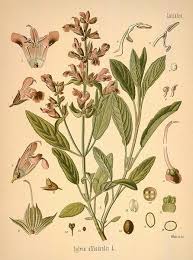Refreshing and cleansing, sage has long been associated with wisdom and healing. Its sharp aroma has warm undertones and traces of camphor. There are several hundred varieties of sage cultivated around the world. Originating from Asia and the Mediterranean, its main use is as a culinary herb.

The essential oil, distilled from the leaves, is potent and should be used sparingly and with caution.
Emotional stimulant
Sage oil is a powerful stimulant and, in small doses, makes an effective antidepressant to strengthen and calm the nerves. It restores vitality after emotional 'burn-out' and relieves nervous debility. It is a tonic to the digestive system, particularly the liver and kidneys. It relieves chronic or persistent respiratory infections and imitates oestrogen, which regulates your periods. As a beauty oil, sage reduces sweat and fights dandruff.
Active Ingredients of Sage Oil
Sage contains a number of healing ingredients.
Ketones
Sage is rich in thujone, cineole and camphor. These compounds are analgesic and calming, but can be toxic. Avoid sage if you suffer from epileptic fits or are pregnant.
Phenols
Sage also contains carvaciol, which stimulates the immune and nervous systems and has antiseptic properties.
Varieties
Spanish sage is believed to be safer than common sage. It lacks thujone, but still contains 29% cineole and 32% camphor, so caution is still necessary.
Uses of Sage Oil
With its remarkable virus-fighting and bacteria-destroying properties, sage oil is best used as an astringent in blends for respiratory, menstrual and odour problems.
Natural Oestrogen
Sage mimics oestrogen, helping to balance menstruation, especially during menopause.
Encourage periods
Solve delayed or scanty periods by massaging the abdomen with:
3 drops sage oil
3 drops jasmine oil
4 drops lavender oil
35ml jojoba oil

Relief from PMS
relieve painful periods with sage's antispasmodic action. combine 2-3 drops each of sage and lavender oils in hot water. Make a compress and lay it across the abdomen until the pain subsides.
Combat menopause
Relieve symptoms of the menopause, including hot flushes and perspiration, with a massage containing:
3 drops sage oil
5 drops geranium oil
4 drops fennel oil
40ml grapeseed oil
Folklore of Sage
Sage's potent healing properties have made it a symbol of purity, healing and everlasting life throughout the world.
Sage is believed to ease grief and is planted on graves in remembrance of the deceased.
The health of a sage bush can reveal your economic future. If it flourishes this signifies a thriving business, but if it withers, a plummeting bank balance will follow.
In medieval times, 'sage the saviour' was believed to have been blessed by the Virgin Mary, who gave it magical properties.
The Ancient Egyptians and Greeks associated sage with immortality. The ancient Cretans would only gather it before sunrise and, for the Romans, the sacred collection of sage involved barefoot gatherers who used silver scythes.
It is an old country custom for the bridal couple to plant sage in their garden. If it flourishes, this signifies the dominance of the wife in the marriage.
Chronic Chest Complaints
Sage is renowned for strengthening the lungs and alleviating persistent chest or catarrh infections.
Soothe sore throats
For a simple sore throat remedy, dissolve 3-4 drops each of sage and tea tree oils in a glass of tepid water. Use this gargle three times a day (do not swallow). Both oils have antibacterial and antiviral properties.
Cure a cough
Ease a tickly cough with a throat, chest and back massage. Combine:
3 drops sage oil
4 drops rosemary oil
2 drops peppermint oil
25ml grapeseed oil.
Relieve your sinuses
Clear a sinus infection with a steam inhalation containing 5 drops each of sage, eucalyptus and thyme oils. Inhale the soothing antibacterial vapours or ten minutes.

Deodorising Sage
Sage attacks bacteria in the mouth that causes odour, leaving a clean fresh scent.
Sage deodorant
Use after a shower:
8 drops sage
6 drops thyme
5 drops peppermint
70ml veg oil
Trainer odour
Sprinkle this blend into shoes and leave overnight:
3 drop sage oil
6 drops rosemary oil
4 drops lavender oil
4 tsp bicarbonate of soda
Fresh mouthwash
For a mouthwash that is especially effective against gum disease, dissolve 4 drops each of sage, tea tree, fennel and thyme oils in 15ml of vodka. Add 250ml of water and leave to infuse in a sealed, dark glass jar. Use as a mouthwash, but do not swallow.